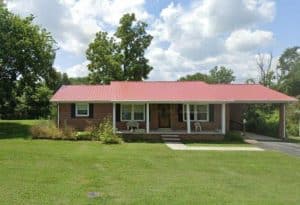November 8, 2023
By: Dwayne Page
The City of Smithville will soon be launching a new transitional housing program for up to eight females with or without children who are in recovery from substance abuse including an on-site residential manager. Tenants will be subject to drug testing and are expected to maintain employment and pay rent of $125 per month. A project manager will periodically visit the site and oversee rent collection, maintenance, etc.
During Monday night’s regular monthly meeting, the Mayor and Alderman approved a Housing Management Plan contract with the Cumberland Regional Development Corporation, a subsidiary of the Upper Cumberland Development District to move forward with the project.
The location for this housing, to be known as Smithville Recovery House #1, is 415 Wade Street. The purchase price is $375,000 (grant funded) and closing on the property is expected within 30 days. The recovery home is to be operational by January.
City officials stress that this home will not be a halfway house nor have any of the negative aspects of a halfway house.
“The tenants will have gone through some type of treatment program, have gotten through the detox, be on the road to recovery, and then be at that level to where they can begin independent living and start working and being productive,” said UCDD and UCHRA Executive Director Mark Farley.
In March, the City of Smithville learned that it had been approved for a Community Development Block Grant through the Tennessee Department of Economic and Community Development in the amount of $433,790 to fund this program.
The Upper Cumberland Development District applied for the grant on behalf of the city last year and the program is to be administered by the Upper Cumberland Human Resource Agency. The grant is 100% funded with no local match requirement by the city.
The city first learned of the grant opportunity last year from Farley. “The state rolled out a new grant this year (2022) to fund two to three projects across the state to help create some transitional housing opportunities for those individuals coming out of substance abuse,” said Farley. “They produced some data to measure how all the communities stacked up. Unfortunately, when you look at it per capita according to their statistics, DeKalb County had the highest percentage of fatal and non-fatal overdoses based on your population. In fact, DeKalb County scored the highest in the state of Tennessee at that time,” said Farley.
Under the grant program, the UCDD and city will partner with UCHRA to manage the transitional housing facility in serving up to eight women in recovery who will be charged rent of $125 per month.
According to Farley, UCHRA will provide wraparound substance abuse programs to the residents of the home along with all the standard programs and services already offered by UCHRA in DeKalb County. Other groups may also get involved.
Three other properties were originally identified by UCDD as possible locations for the home including at 411 Juniper Lane, 805/809 West Broad Street, and 1309 South College Street but neither of those options worked out.
UCDD is subcontracting the project with CRDC which already houses approximately 400 other UCDD rental units across the region.
“The city will transfer the project over to CRDC through a subcontract from UCDD. After you confer it over to us CRDC will handle all the steps to acquire the property, make any renovations necessary, and assume all expenses of the property moving forward. The site will remain on the tax rolls for collection of property taxes and whatever else is due from that standpoint,” said Farley.
In March Mayor Josh Miller named Aldermen Beth Chandler and Jessica Higgins, with the approval of the city council, to co-chair an oversight committee consisting of community members, faith-based leaders, and other stakeholders including recovery court representatives to work with the partnering agencies on how the program is to be established and operated.
“I believe this transitional housing is going to be a great thing for moms and children. I toured the Emmanuel House in Carthage, which is similar to this project, and was very impressed with how well it seems to function. I know this is our first time with something like this but I’m confident we will get it right,” added Mayor Miller.
“My goal is for Smithville to be a model for other cities and I think it will be run great. I have even spoken to Judge Brandon Cox about this and he is excited about it as well. I also want to thank Aldermen Chandler and Higgins and the committee as well as City Attorney Vester Parsley for the time and thought which has been put into this because I think it’s going to be a good thing,” added Mayor Miller.
“We believe we have developed a model that can handle up to eight people and make it financially work,” said Farley. “Between the rental income we also have some contracts with the state that administers services which would help recover costs of it as well. The contract has terms that require that the house be a recovery home for at least four years. If for some reason it became not viable and could not sustain itself within that time, we would probably liquidate the property and that money would either go back to the state department of economic and community development or back to the city. If at the end of four years we thought it would not be sustainable going forward, we would probably turn it into low-income rental housing like we operate already,” said Farley.
Myra Walker of CRDC in Cookeville is the contact person for the managing agent of this project.




